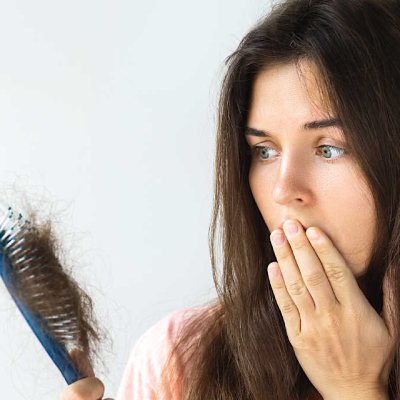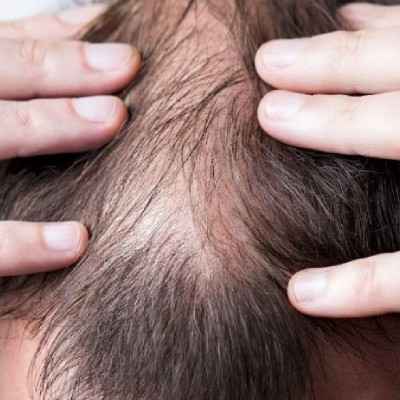Hair Shedding vs Hair Loss: Know the Difference

28 May 2022

Hair Experts @ AHS

The distinction between thinning and atypical hair loss is critical if you notice that your hair density and thickness have decreased throughout, rather than just in one place. Non-scarring alopecia is the subject of the following discussion.
The distinction between thinning and atypical hair loss is critical if you notice that your hair density and thickness have decreased throughout, rather than just in one place. Non-scarring alopecia is the subject of the following discussion.
What is Hair Loss?
Approximately 35 million men and 21 million women in the United States have some degree of hair loss, according to a 2014 poll conducted by the International Society for Hair Restoration Therapy. This accounts to roughly 25% of the total US population.
The numbers, if looked at in similar ratios for the Indian subcontinent, would constitute a very high percentage of the entire population.
Hair loss affected an estimated 20% of Americans under the age of thirty in 2014. Approximately 320 million Americans are affected by hair loss, with males suffering more than women.
Men are more likely to lose their hair as they become older. By the time males reach the age of 35, 40% of them have noticeable hair loss; and by the time they reach the age of 60, the figure rises to 60%. By the time men reach their late forties or early fifties, about half of them have visible hair loss.
Women's figures are significantly higher than men's. According to another study, hair loss affects around 40% of women when they reach the age of 40. A study conducted by the World Society for Hair Restoration Surgery found that by the time women reach 60, around 80% of them suffer from hair thinning.
Depending on the severity, hair loss (Alopecia Universalis) may impact just the scalp or the whole of your body. Hereditary factors, hormonal shifts, medical disorders or the natural course of ageing may all play a role. In general, males are more likely than women to lose hair around their heads, although it may happen to anybody.
Typically, baldness refers to significant scalp hair loss. Our hair begins to fall out as we become older due to natural hair loss. Some individuals choose to let their baldness go untreated and unhidden because they don't want to. Hairstyles, cosmetics, hats and scarves may be used to hide them. Then some choose a therapy to stop additional hair loss or regrow it.
You should consult your doctor before beginning hair loss therapy to learn more about the cause of hair loss and the various treatment choices.
What is Hair Shedding?
Hair shedding is a normal part of maintaining a healthy scalp. In cases when the equilibrium is disrupted, hair loss occurs, as more hair starts to fall out and much less grows in. Hair thinning is not the same as hair shedding. If you're losing your locks, you're suffering from "alopecia."
Causes of Hair Loss & Hair Shedding
Some of the most common causes of hair loss are a lack of proper diet and stress. Finding out what's going on with your scalp is essential to finding the best therapy for your hair loss. There are several causes of hair loss, resulting in baldness and noticeable hair thinning. It's not uncommon for hair loss to occur due to an underlying health issue that has to be addressed. If the cause of your hair loss is a medical illness that affects your hair, such as alopecia areata, then your hair loss may be irreversible.
Hair Loss Associated with Thyroid Issues
Hair development is one of the many functions that hormones control. Both hypothyroidism and hyperthyroidism may lead to hair loss due to a hormonal imbalance, so that both conditions can cause hair shedding. Treatment for any of these thyroid problems can help manage hormones, halt hair loss and enable your hair to begin growing again.
Hair Loss after Pregnancy
Hair loss may also be caused by other hormonal imbalances, such as the rapid changes in hormone levels after delivery and pregnancy. It's not unusual for post-pregnancy women to experience thinning hair and even patches or baldness when their hormone levels return to normal. About three months following the infant's birth, this is common. Don't worry; your hair follicles will recuperate as your body does. It's just a matter of time until your hair grows back.
Hair Loss Due to Drugs
Hair loss may occur as a secondary effect of several popular drugs. Hair thinning or baldness may be caused by various medicines, including blood thinners, antidepressants, NSAIDs or beta and calcium channel blockers. Too much vitamin A may lead to hair loss, retinoids and vitamin A derivatives. There have been reports of complete hair loss as a side effect of several chemotherapy medications used to treat certain types of cancers. When patients stop taking any medicine that causes hair loss, their hair should come back the same way it did after chemotherapy.
Alopecia: The Many Forms
Both alopecia areata and androgenic (androgenetic) hair loss come under the umbrella term alopecia, which is used medically to refer to hair loss. All across the body or just the scalp, dermatitis may cause hair loss. It may cause hair thinning, bald patches, partial or complete baldness and transient or permanent baldness. Many factors, including heredity, have a role in a person's susceptibility to mental illness. Consult your physician to learn about treatment options.
Hair Follicles are Shocked by Physical Trauma
You may notice thinning hair or clumps of hair coming out of your scalp when the body is under extreme physical stress. Your body's normal cycle of development and rest may be disturbed, leading to hair loss. It is possible to lose up to 75% of your hair after a significant trauma to the body, like a car accident or a severe illness, and this hair loss may continue for months after that.
The Effects of Emotional Stress on Hair

In addition to the physical and emotional toll that a life-altering event like a breakup, divorce or financial difficulties may have, the loss of a house or a loved one can also affect your hair growth cycle. Temporary hair loss may be caused by significant mental stress, but normal hair regrowth is usually restored after stress is kept under control.
Your Hair is a Symptom of Your Diet
A healthy, diverse, well-balanced diet provides necessary vitamins and minerals, such as protein, that keep your organs and other internal systems functioning well. Deficiencies in nutrients may contribute to hair loss, from fine hair to complete baldness, due to poor nutrition or an extremely restricted crash or fad diet.
All-In-One Haircare
Damage and breaking strands may lead to hair loss or thinning, so be careful while trying out new hairstyles. These things may cause hair loss, including excessive shampooing or blow-drying, excessive use of styling equipment, excessive tugging on the hair or too violent massaging of the scalp.
Hair Loss-Inducing Infections
A variety of disorders and infections may cause hair loss. Hair loss may be caused by an illness that produces a high temperature, fungal skin diseases and infectious diseases like syphilis. Hair loss may be reversed and avoided in the future by treating the underlying infection. So, the first thing you should do is consult a doctor about your health issues.
Hair Loss Associated with Autoimmune Diseases
In other cases, hair loss may be caused or at least connected to an autoimmune illness, such as alopecia areata, which is often linked with this condition. Hair loss may occur due to autoimmune disorders, such as diabetes and lupus. In some instances, hair loss caused by this treatment may be irreversible. Medications and surgical procedures for hair restoration, on the other hand, may be able to make up for just any hair loss.
How to Know if it's Hair Loss or Hair Shedding
It's possible that you're losing more than 100 hairs every day or that your hair is thinning. To tell the difference between hair loss and shedding, it's essential to look at your pillow and your comb and see whether there are more hair strands on them. If you're concerned about hair loss or shedding, see a dermatologist for help.
Consult a Hair Specialist/Doctor
When searching for a hair loss specialist, it's crucial to be aware of the facts to ensure that you get the most effective therapy possible. Specific causes may lead to hair loss, including alopecia areata, immune disorders, anaemia, thyroid problems, traction alopecia and outright balding. Women's hair loss after pregnancy and menopause may be caused by polycystic ovary syndrome, one of these conditions.
Trichologist or Dermatologist
Are you looking for Hair loss treatment? A dermatologist is the best choice since hair loss has many different reasons, which necessitates a precise diagnosis. Unlike trichologists, certified and recognised by the Institute of Trichologists, dermatologists have had formal medical training.
- If you have a problem with your skin, hair or nails and are looking for a doctor specialising in that area of medicine, a dermatologist is your best bet. A dermatologist is a medical specialist who specialises in skin conditions. A trichologist is a specialist in all things relating to the hair and scalp, such as making it look its best.
- This level of education and experience is critical. Typically, a trichologist will spend up to four years in training. There were six years of med school, two years of primary medical education, four years concentrating on Dermatology and an additional one-year period dedicated to my interests in dermatology. It takes 13 years of experience to specialise in skin, allowing for the management and therapy of a broad spectrum of hair loss issues. It is rare to find dermatologists who solely focus on hair loss.
- A trichologist may aid in certain circumstances, but since they are not clinically educated, they can only provide patients with topical treatments for hair loss. On the other hand, a dermatologist has the skills and experience to run tests that aid in the diagnosis and assessment of the problem and assist in determining the best treatment plan.
- It's possible to assess hair's density, presence of regrowing hairs or scalp irritation using non-invasive techniques. Video dermoscopy, a non-invasive procedure, provides a quick and enlarged observation. Using a trigonometrical device, we may get a numerical representation of the hair's quality. Every one of these is critical to a thorough diagnosis. Additionally, a scalp biopsy may be performed by dermatologists under regional anaesthesia and examined by a histopathologist. Hair loss situations often need the use of these diagnostics.
- A dermatologist can only perform these tests, and without them, an accurate assessment and diagnosis are impossible. Treatment is more effective when the root cause of the problem is discovered. Trichologists do not prescribe many oral medicines for hair issues, but dermatologists may. Thus here are some reasons why you should go to a dermatologist instead.
- The diagnostic tools and procedures available to a dermatologist enable them to better assess your baldness and its underlying causes, increasing the likelihood of successful hair restoration. These therapies aren't the only ones dermatologists may prescribe; they can also use alternative methods, such as injecting minoxidil into the scalp, administering spironolactone pills or using a combination of these and other oral treatments. A trichologist may only prescribe minoxidil of different strengths for hair loss.
You should contact an experienced dermatologist if you are worried about hair loss and want the best treatment and guidance. When you discover what's causing your baldness and begin the best hair treatment or therapy, your outcomes will be better.
Conclusion
Hair Shedding vs Hair Loss may be caused by a lack of certain nutrients in your body. For healthy hair, take a multivitamin with biotin every day. For vitamin deficiencies, see your dermatologist or a trichologist and get the supplements you need.
Stay Updated
Subscribe to our email newsletter for helpful tips and valuable resourses
Be an influencer
Join forces with Advanced Hair Studio! Explore exciting collaboration opportunities tailored for influencers. Let's redefine haircare together.
Connect now












